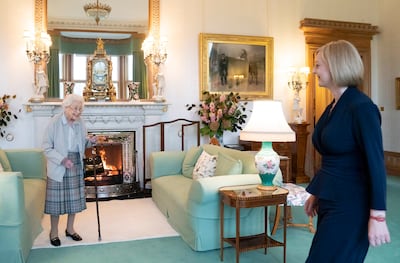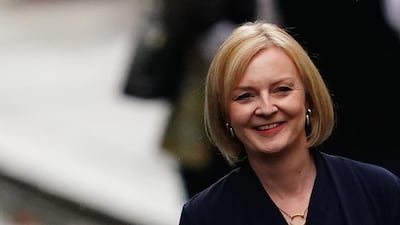Now that Liz Truss has replaced Boris Johnson as the new Conservative Party leader and UK prime minister, all eyes are on what policies she will offer a country beset by several crises.
After weeks of rudderless politics, Britons are desperate for hope and clarity on how Ms Truss will tackle a strained healthcare system, soaring inflation, successive labour strikes and sky-high energy prices.
Despite a domestically focused administration, there are indicators that the UK's approach to the Middle East will change
As the former foreign minister knows all too well, the outside world will also be looking to see how the leader of “global Britain” sets out her international relations agenda.

The director of the Middle East and North Africa programme at Chatham House in London, Lina Khatib, said the interconnectedness of the region and Britain’s economic interests showed why the UK “must not compartmentalise its approach to the Middle East". The country should also adopt a revised approach that would “give the region the attention it requires”.
“Diplomatic engagement on Iran’s regional role is a key factor in strengthening trust between the UK and its Middle Eastern allies, including in the GCC, which in turn supports the UK’s economic and security priorities,” wrote Ms Khatib following the announcement of Ms Truss’ leadership win.
In search of new trading partners and a boost for the UK economy
Given the financial woes facing the UK, a critical priority will undoubtedly be the protecting of a free trade deal with the six GCC members. This is currently under negotiation and thought to be worth $1.6 billion a year to the UK economy.
Ms Truss, who formerly served as secretary of state for international trade, is expected to remain “just as desirous” to conclude this “trade policy priority”, the Arab British Chamber of Commerce said.
“We can therefore be quite optimistic about the prospects for the development of UK-Arab co-operation under this new administration,” Bandar Reda, chief executive of the ABCC, told The National.
Mr Reda said a successful conclusion of a UK-GCC free trade agreement would have an “impact that resonates” across wider Arab economies that would benefit from strengthened relations with “some of the world’s advanced and dynamic economies.”
UK investors and traders are also keen reap the rewards of new business that comes from the introduction of the “vision strategies” of various Arab countries, said Mr Reda, who used to head up the Saudi commercial attache office to the UK.
“The conditions are highly favourable for bilateral trade and investment between the UK and the Arab countries to flourish,” he told The National.
“We will seek to work together to bring the opportunities in their broadest spectrum to the attention of the UK and Arab business communities."
Crises at home, conflicts abroad
With mounting domestic woes to contend with and Ukrainian defence to support, a Truss government is unlikely to intervene in the continuing Middle East conflicts.
Despite the UK’s characterisation of Iraq and Syria as "post-conflict" and in "crisis", the reality on the ground continues to be violent and destabilising.
In Libya, where the most recent clashes between rival leaders vying for power killed dozens in the capital Tripoli, the country’s long-awaited political and economic stability looks unreachable.
While it was arguably too much foreign intervention in the oil-producing country that exacerbated its current fracture and volatility, competing political players in Tripoli and Benghazi are vying for international support in their bids to assume power.
Libya’s ambassador to the UK told The National that while he does not expect Britain’s existing hands-off approach to change much under Ms Truss’s leadership, his Tripoli-based government would very much like this to change.
“We want a more active, committed and bolder role from the British side towards promoting democracy and development and helping us stand against the projects of the return of totalitarian regimes,” Salah Mrehil said.
Suggesting that the UK would benefit financially from taking an active role in stabilising the country, which is in need of massive infrastructural development, Mr Mrehil said Ms Truss should understand that “the greater the risk, the greater the profits".
“Any country that will contribute a great deal to the stability of Libya will be the first to benefit from achieving stability and development, which will include billions of dollars in investments in the fields of energy, services and infrastructure."
While the UK would be content to see a political solution materialise in Libya — and the financial benefits this would bring — Britain is unlikely to “put in the hard yards to get it”, the Council for Arab British Understanding said.
“I don’t think we will do anything on Syria either, but that has been the case for years, and I don’t see anything being done in Lebanon either or Yemen,” the council's director Chris Doyle told The National.
As for the Middle East’s most enduring conflict, Mr Doyle said Ms Truss’s time as foreign secretary showed that she had “no interest in the Israel-Palestine conflict” but was “keen on warm relations with Israel".
“She sees the plight of Palestinians as unhelpful to furthering the UK’s relationship with Israel,” said Mr Doyle, who was critical of the "lip-service" paid to questions around human rights.
During her leadership bid, Ms Truss controversially suggested she would review moving the UK’s embassy from Tel Aviv to Jerusalem, showing that “she is prepared take an arsonist's approach if it will advance warm relations,” Mr Doyle said.
Ms Truss failed to condemn Israeli violence and human rights abuses against Palestinians while foreign secretary. She also did not call for an investigation into the Israeli killing of veteran Palestinian journalist Shireen Abu Akleh and advocated Israel’s "right to defend itself" during its assault on Gaza in August. As such, she is unlikely to adopt a more critical approach as prime minister.
“Along with the BBC — arguably our biggest soft power — also at risk of being eroded, I think she will ultimately burn away whatever is left of the British reputation in the Middle East,” Mr Doyle said.


